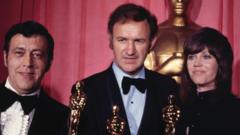Gene Hackman, a towering figure in Hollywood, has passed away at the age of 95. The beloved actor, known for his intense performances and unique dedication to his craft, has been the subject of many heartfelt tributes following his death in New Mexico. Barry Sonnenfeld, director of the iconic film "Get Shorty," remembered Hackman as someone who loved acting but dreaded the associated chaos of Hollywood.
Hackman was notorious for his meticulous approach to scripts, preferring to strip away directions that he felt constrained his performances. This habit showcased his belief in complete artistic ownership over his roles. He cared deeply about the authenticity of his characters, resisting the attempts of scriptwriters to dictate his emotional expressions. As Sonnenfeld described, Hackman's unconventional method involved reworking scripts to align with his vision – a testament to his talent and self-confidence as an actor.
While he was a dedicated artist, Hackman struggled with the demands of celebrity life, often expressing frustration over lengthy makeup sessions and the obligatory social engagements that accompanied film projects. Fellow director John Moore recalled Hackman's desire to focus solely on acting, remarking that the actor's aversion to frivolous interactions stemmed from his determination to excel in his work.
His professional demeanor contrasted sharply with some co-stars, notably John Travolta, with whom he clashed due to a lack of preparation on set. Their head-on confrontation during filming became legendary, though Hackman's intensity to maintain high standards often turned personal grievances into moments of levity for his colleagues. Moore reflects on his time with Hackman as one of respect and professionalism; he expressed that while Hackman had his limits, it was all in pursuit of excellence.
Hackman's decision to retire from acting in 2004 triggered a quiet life in Santa Fe, far removed from the Hollywood limelight he had both cherished and loathed. He was quoted in a rare interview discussing how the stress of the film industry compelled him to step away, although he would always fondly remember acting itself as the highlight of his nearly six-decade career.
His passing has left an indelible mark on the film industry, with many honoring his legacy at entertainment events such as the upcoming Oscars. Hackman's journey as an artist encapsulated a profound tension between appreciating the art form and rejecting the compromises of the business, leaving behind a rich legacy that continues to inspire new generations of actors.
Hackman was notorious for his meticulous approach to scripts, preferring to strip away directions that he felt constrained his performances. This habit showcased his belief in complete artistic ownership over his roles. He cared deeply about the authenticity of his characters, resisting the attempts of scriptwriters to dictate his emotional expressions. As Sonnenfeld described, Hackman's unconventional method involved reworking scripts to align with his vision – a testament to his talent and self-confidence as an actor.
While he was a dedicated artist, Hackman struggled with the demands of celebrity life, often expressing frustration over lengthy makeup sessions and the obligatory social engagements that accompanied film projects. Fellow director John Moore recalled Hackman's desire to focus solely on acting, remarking that the actor's aversion to frivolous interactions stemmed from his determination to excel in his work.
His professional demeanor contrasted sharply with some co-stars, notably John Travolta, with whom he clashed due to a lack of preparation on set. Their head-on confrontation during filming became legendary, though Hackman's intensity to maintain high standards often turned personal grievances into moments of levity for his colleagues. Moore reflects on his time with Hackman as one of respect and professionalism; he expressed that while Hackman had his limits, it was all in pursuit of excellence.
Hackman's decision to retire from acting in 2004 triggered a quiet life in Santa Fe, far removed from the Hollywood limelight he had both cherished and loathed. He was quoted in a rare interview discussing how the stress of the film industry compelled him to step away, although he would always fondly remember acting itself as the highlight of his nearly six-decade career.
His passing has left an indelible mark on the film industry, with many honoring his legacy at entertainment events such as the upcoming Oscars. Hackman's journey as an artist encapsulated a profound tension between appreciating the art form and rejecting the compromises of the business, leaving behind a rich legacy that continues to inspire new generations of actors.






















